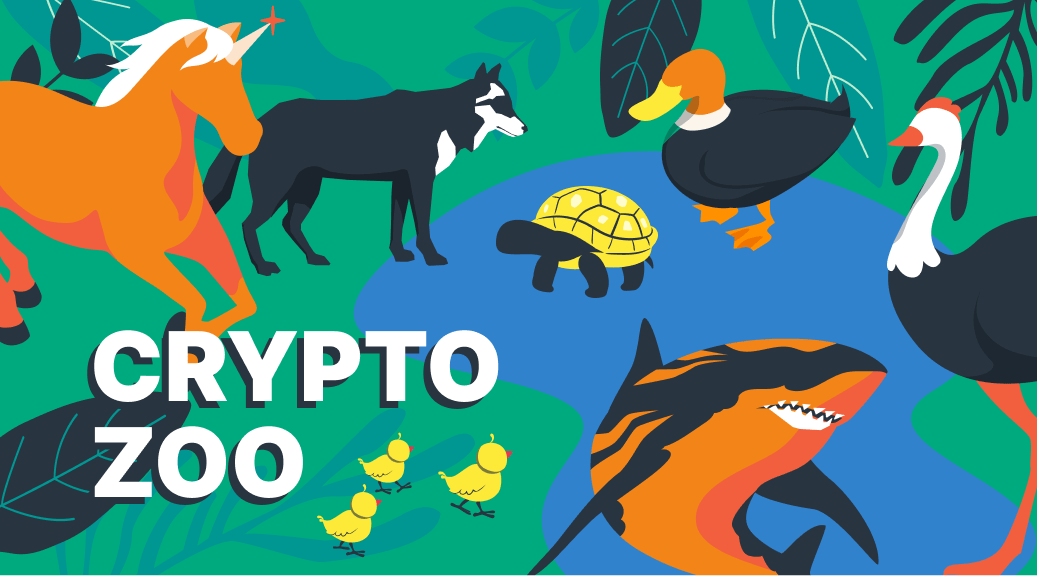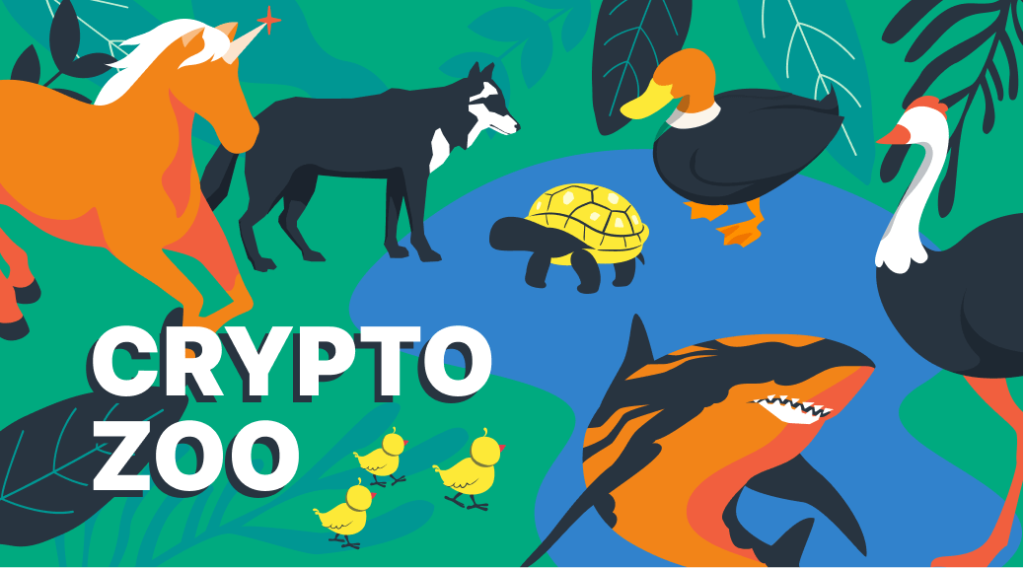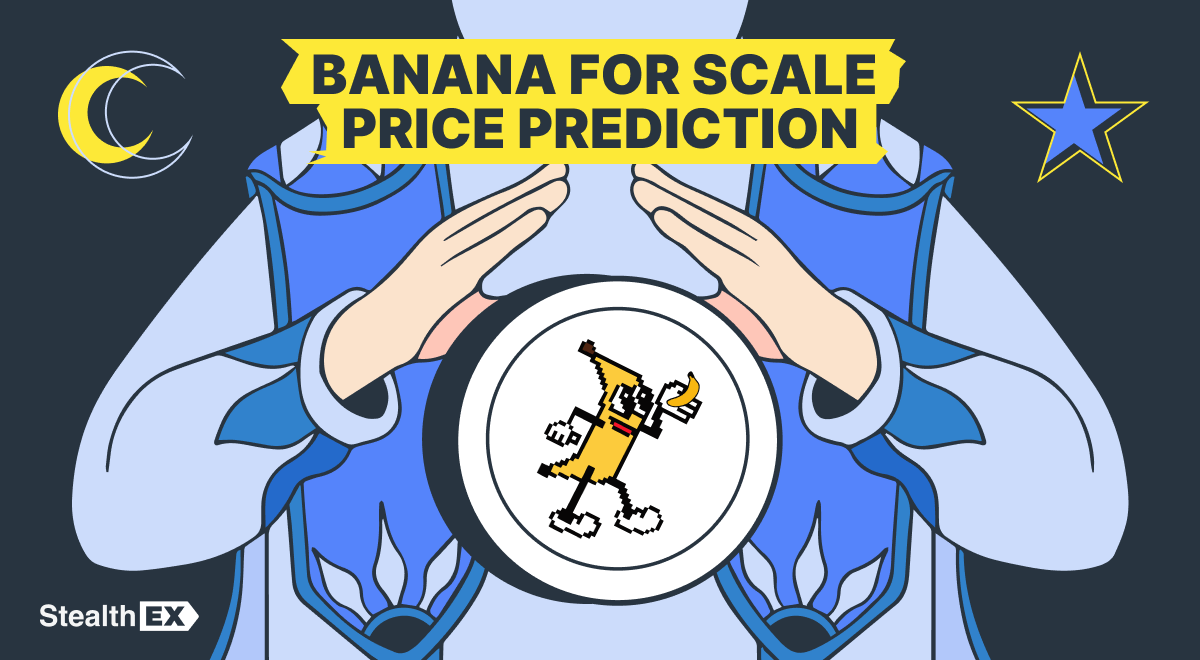Animals in the Crypto Investing Market

Welcome to our happy crypto zoo! This is the second part of the article about different animals in crypto investing. You can read the first part here – Overview of Crypto Whale, Bull, and Bear.
While you can often come across whales, sharks, bears, and bulls when talking about cryptocurrencies, there’s a number of other exotic animals that live in the world of crypto. You can’t always say who they are or what they do judging solely by the animals’ species. Let’s get on with some more exciting and lesser-known terms, also giving some insight into the culture behind cryptocurrency. First, we’ll touch on the non-existent crypto animals…

Article contents
Popular Crypto Investing Slang: Animals
Bearwhale
This word is a mix of the two popular terms that we discussed in the previous article. What kind of animal breed would this be? Well, in fact, this is the name of a trader with huge financial opportunities who is pessimistic about some cryptocurrency and expects its quotes to fall.
Let’s top it off with a couple more terms related to bears. Things like ‘bearish,’ ‘bear trap,’ and ‘bear flag’ also fall into this category. The term ‘bearish’ means a trader is pessimistic and that the price will go lower from where it currently is. If you are bearish on a market, you believe that the market is going to fall.
A ‘bear trap’ is a situation when traders put on a short position when the price of a currency pair is falling, only for the price to reverse and move higher. A ‘bear flag’ is a technical pattern that provides an extension/continuation to an existing downward trend. The bear flag formation is underlined from an initial strong directional move down, followed by a consolidation channel in an upwards direction. The strong move down is known as the ‘flagpole’ whilst the consolidation is referred to as the ‘flag’ itself.
Unicorn
Financiers seem to have grown fond of the animal representations in the markets. In the stock market, we have bulls and bears battling about price levels and even unicorns that prevail over all of this. A relatively new term, a ‘unicorn’ is a privately held startup company, often in the tech industry, valued at more than $1 billion and potentially destined for even greater riches after an initial public offering (IPO). In recent years, some of these unicorn companies have held IPOs, only to see their shares sag.
Apes and Apeing
The term ‘apeing’ can be seen often across the crypto community. Coming from the term ‘ape’, apeing is used when a trader buys a new token or a coin, for instance, right after its launch, without doing any proper research or due diligence. Why would a trader do this? Buying something to trade without any research is obviously not a wise move. Well, such a trader is usually doing so when they have a certain fear that they may be missing out on the next big thing or when having FOMO, the Fear of Missing Out.
Rabbits
A lot of slang in the crypto industry also derives from trading on the stock market. The term rabbits are used to describe those traders or investors who take a position for a very short period of time. The trading time of these traders is typically in minutes.
These types of traders are scalpers and trying to scalp profits during the day. They do not want overnight (or long-term) risk and are just looking for an opportunity to make some quick bucks for the market during the day.
Turtles
The turtles are typically those investors who are slow to buy, slow to sell, and trades for the long-term time frame. They look at the long-term frame and try to make the least possible number of traders. This kind of investor does not care about the short-term fluctuations and is most concerned with long-term returns.
Sheep
Sheep are those kinds of investors who stick to one investing style and do not change according to the market conditions. They are usually the last ones to enter an uptrend and the last one to get out of a downtrend. The sheep like to be on the side of the majority (herd) and follow a guru. They are not interested in developing their own investing/trading method.
Pigs
These investors or traders are impatient, willing to take high risk, greedy, and emotional. These investors don’t do any kind of analysis and always look out for hot tips and want to make some quick bucks from the share market. Pigs are the biggest losers in the market.
Chickens
Chicken refers to those investors who are fearful of the stock market and hence do not take risks. They stay away from the market risks by sticking to conservative instruments such as bonds, bank deposits, or government securities.
Ostriches
Ostriches are those kinds of investors who bury their heads in the sand during bad markets hoping that their portfolio won’t get severely affected. These kinds of investors ignore negative news with an expectation that it will eventually go away and will not impact their investments. Ostrich investors believe that if they do not know how their portfolio is doing, it might somehow survive and come out alright.
Dogs
Dogs are those stocks that have been beaten down by the market due to their poor performance. Many financial analysts look into the dog stocks closely as they expect these stocks to recover in the upcoming days.
These investors or traders are not really interested in a bull or bear market. They just lookout for opportunities. They are neither bullish nor bearish. For instance, stags can be the traders who buy the share of a company during its initial public offering (IPO) and sell them when the stock is listed and trading commences. They do stagging with the hope to get listing gains and hence these individuals are called stags.
Wolves
Wolves are powerful investors/traders who use unethical means to make money from the share market. Mostly, these wolves are involved behind the scams that move the share market when it comes to light.
Lame Ducks
A lame-duck is a type of trader or investor who trades and ends up with a huge loss. Lame ducks have either defaulted on their debts or gone bankrupt due to the inability to cover trading losses. The phrase can be traced to the early years of commodity trading and the development of the London Stock Exchange during the mid-1700s.
Hawks and Doves
Hawks and doves are terms used to describe the types of policymakers who take critical stances on different economic situations. In the US financial markets, ‘hawkish vs. dovish’ typically refers to opposing approaches toward interest rates and Federal Reserve monetary policy. A ‘hawk’ wants a tough stance in an economic situation, whereas a ‘dove’ wants to be easy with it.
Dogs of the Dow
This is a popular investing strategy where the investors select the 10 highest dividend-yielding blue-chip stocks from the Dow Jones Industrial Average (DJIA) every year. The main reason to follow the Dogs is that it presents a straightforward formula designed to perform roughly in line with the Dow. This concept was originally published by Michael O’Higgins’ in his book, ‘Beating the Dow,’ in which he also coined the name ‘Dogs of the Dow.’ Similar to this concept, Dogs of the Sensex is used in India.
Dead Cat Bounce
The dead cat bounce slang is used to refer to a temporary recovery during the bear run. Either it could mean a temporary upswing of the market in the midst of a bear run or it could refer to the particular stock behavior. Interestingly, this phrase has been employed from the explanation that if you throw a dead cat against a wall at a high rate of speed, it will bounce – but it is still dead.
Flying over the Crypto Nest
Animal slang isn’t limited to stocks. Several options strategies are named after insects and birds. Butterfly spreads, condors, and iron condors are among options strategies that aim to profit through the passage of time or through changes in volatility (or lack of change).
A long butterfly spread, for example, uses options contracts based on a 1:2:1 ratio, where the single options on the outside are long positions, or the ‘wings,’ and the two options in the middle are short, making up the ‘body.’ The shapes of their risk profile graphs resemble winged creatures, with the butterfly having a more pointy head than the condor or iron condor.
Black Swan
Perhaps the scariest animal in the Wall Street zoo is a black swan, which means a deepest crisis. A black swan generally applies to outlier, extreme-impact events that people are never prepared for. The 2008 collapse of Lehman Brothers, the May 2010 ‘Flash Crash,’ and the 2016 Brexit vote are considered black swans. The term was popularized by Nassim Nicholas Taleb, a finance professor, writer, and former Wall Street trader, in his 2007 book The Black Swan: The Impact of the Highly Improbable.
Hamster
Finally, let’s top off our zoo with… An actual hamster. A German hamster named Mr. Goxx has jumped on the bandwagon along with millions of other crypto enthusiasts in the fall of 2021.
The hamster’s human business partner made an initial investment of just over $300 Euro and the hamster runs around an ‘intention wheel’ to select a particular coin. Next, the hamster runs through either a buy tunnel or through a sell tunnel. Each time the hamster does this, his human partner either buys or sells $20 worth of the chosen cryptocurrency.
The hamster’s buy and sell orders have been posted on both Reddit and Twitch and his performance is fairly impressive. In September 2021, Mr. Goxx had earned around a 20% return on his initial investment since June, beating both the S&P 500 as well as the performance of Warren Buffett’s flagship Berkshire Hathaway fund.
If you are looking to buy crypto, you can always use the user-friendly and non-custodial StealthEX crypto exchange platform. You can purchase crypto privately and without the need to sign up for the service. Our crypto collection has more than 600 different coins and you can do wallet-to-wallet transfers instantly and problem-free.

Make sure to follow us on Medium, Twitter, Telegram, YouTube, and Reddit to get StealthEX.io updates and the latest news about the crypto world. If you need help, drop us a line at [email protected].
Please make sure to always research any cryptocurrency and assess your risks before you invest.
crypto bear market crypto bull run crypto world invest in crypto investingRecent Articles on Cryptocurrency
 Bakkt Files $1B BTC Buy, GameStop Raises $2.7B, Ripple-SEC End 5-Year Fight
Bakkt Files $1B BTC Buy, GameStop Raises $2.7B, Ripple-SEC End 5-Year Fight  Banana For Scale Price Prediction: Can BANANAS31 Coin Hit $1?
Banana For Scale Price Prediction: Can BANANAS31 Coin Hit $1? 